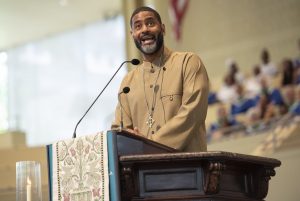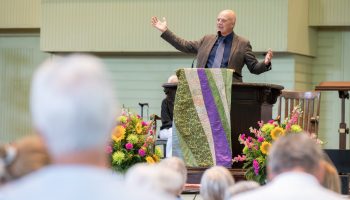
“If I were in Chicago today, I would ask you to turn to your neighbor,” said the Rev, Otis Moss III at the 10:45 a.m. Ecumenical Service of Worship and Sermon Sunday in the Amphitheater. “I am not in Chicago, but I am going to ask you to turn to your neighbor and say after me, ‘Neighbor, oh neighbor, we must bring those who are broken by life to God by any means necessary.’ ”
Moss’ sermon title was “By Any Means Necessary,” and the Scripture reading was Luke 5:17-26, the healing of a paralyzed man.
He read the Scripture again for emphasis. “Tina (Downey) read the New International Version, now I am going to read the OM3 translation,” he said. OM3, meaning Otis Moss III.
In the OM3 version, Jesus was lecturing to the Sunday school teachers, lawyers, scholars and anyone who thought they knew more than anyone else. A man, broken by life, was brought by his friends because they thought Jesus could help him. Everyone was blown away when Jesus told the man his sins were forgiven and to take his mat and go on home.
“I want to lift up that great cultural icon, el-Hajj Malik el-Shabazz, also known as Malcom X, born Malcolm Little,” Moss said. “He revered the teachings of Marcus Garvey and then Elijah Muhammad, and he became the prophet of black self-esteem.”
Why lift up the voice of a Muslim icon? Moss asked.
“Because the truth is not exclusively heard in the Christian decibels,” he said. “God has a right to use whomever God chooses.”
Malcom X, Moss said, believed that oppressed people were declaring their right to be human beings, their right to respect as human beings, “by any means necessary.”
“No one can determine for you the conditions of liberation,” Moss said. “The status quo only wants to use orthodox means. It is a tragedy when only one way is the orthodox way. That means that there are some who are above and some who are below in the hierarchy. We must be willing to connect with God by any means. We humans love to place limits on God, to keep God in finite hands with limited vision. God can’t be boxed.”
God, Moss said to the congregation, is beyond anthropomorphic words.
“Our language can’t express all that God is,” he said. “If God is only male, we are only allowing God to work at 50% capacity.”
God has to be trans in nature, Moss said.
“God is mother to the motherless and father to the fatherless,” he said. “In the pathway to God we have to let go of our boxes.”
Moss returned to the text from the Gospel of Luke. He set the scene of Jesus teaching in the house to the “Sunday school teachers and scholars and those who thought they knew something.”
The focus of the story was on the people in the house.
“God is always lurking at the margins,” Moss said. “A group of brothers came along carrying another brother in deep need. The disinherited were trying to get into the presence of God.”
Moss warned the congregation not to adopt the “empire style of faith — capitalism in religious garb.”
The man on the mat had some faithful friends.
“He had been broken by life,” Moss said.
Although the text does not tell how many friends the man had, Moss said he thinks there were four of them. These friends thought it would be good for the man on the mat to meet Jesus.
“Let me give a word to parents: Sometimes you just have to expose your children to the right values, put them in the presence of the right values, and they will pick them up,” Moss said.
There was one friend on each corner: north, south, east and west.
“Each brother was working his corner,” Moss said. “That is a big challenge — there is too much corner conflict instead of working your own corner. Work your own corner, focus on what God called you to do. Work your corner and bring those who are broken into the presence of God.”
Moss said he knew the four friends were brothers “because they couldn’t get in the front door. Religious people blocked their access to the love of God. The church has these patterns of restriction for people who can’t get in the front doorway.”
The brothers were going to get in one way or another.
“From the colonizing perspective, there is only one way in, but God is always saying you can do it differently,” Moss said.
Jesus used a variety of methods to heal people, from just sending them on their way, to someone touching his hem, to spitting on dirt and applying mud to blind men’s eyes.
“We tend to deify the method instead of the message,” Moss said.
He asked the congregation to raise their hands if they remembered 78 records, then 45 records, 33 1/3 records, LP’s, 8-tracks, CDs, MP3s and streaming, Spotify and iTunes.
“Take the song ‘Amazing Grace’ — it is the same song no matter what method you use to play it,” Moss said. “But we have 8-track people in a streaming world who are focused on the method and not the message.”
There was no side or back door on the house, so the brothers decided to tear the roof off. They made their own door.
“There was a sudden noise, and now everyone in the house was looking up,” Moss said. “The brothers used a different method and they shifted the focus.”
The man on the mat was dropped into the front row because of the commitment of others.
“Jesus saw their faith and blessed the man,” Moss said. “Let me say that again. Jesus saw their faith and blessed the man. You are still not getting it. He saw their faith and blessed him.”
But the man had never asked to be blessed, Moss said.
“You have to hang out with the right people to get a blessing,” he said. “I call this a ‘bank shot blessing’ — you aim your shot over here and someone over there is blessed.”
Jesus saw the man at his feet and forgave his sins. The man was happy, but he wanted to get up and walk. Moss said that we need spiritual healing before we can have biological healing.
“If we change our theology, then we can change our anthropology, then our psychology, then our sociology so that those are not ‘illegal people’ coming over the border, but each is a child of God,” Moss said. “Then we can change our biology because the endorphins will begin to flow. Having the wrong theology messes up the whole chain. When we see these people as children of God, we can see our whole nation differently.”
Jesus asked the people sitting in front of him if it was easier to forgive sins or tell someone to take up his mat and walk. They said nothing.
“Jesus told him to take up his mat and walk,” Moss said. “His bed was a sign of his affliction, a symbol of his marginalized poverty. People would see how it is possible to get up from a life of begging. When they asked him how he could walk, the man could say, ‘I met a man named Jesus.’ ”
In Chautauqua, Moss said, you have queers sitting beside Quakers, Presbyterians sitting beside Pentacostals, Methodists sitting beside Muslims.
“Everything here is a tapestry of the nation,” he said. “You have to work your corner when you leave Chautauqua. If you can change your corner, you can change your neighborhood. If you can change your neighborhood, you can change your city. If you can change your city, you can change your county. If you can change your county, you can change your state. If you can change your state, you can change your region. And if you can change your region, you can change this nation.”
Moss told the congregation to work their corners “by any means necessary.”
“Work your corner and change the nation,” he said. “Work your corner and make this the nation is was meant to be. Work your corner.”
Before Moss finished his sentence, the congregation was on its feet, giving him a standing ovation.
The Rt. Rev. V. Gene Robinson, vice president of religion and senior pastor, presided. Tina Downey, director of the Chautauqua Fund, read the Scriptures. The Sanctuary Choir of Trinity United Church of Christ, Chicago, blessed the space singing “Every Praise to Our God,” under the direction of Marcus Griffith. They were accompanied by the Voices of Trinity Band. The Chautauqua Choir, under the direction of Jared Jacobsen, organist and coordinator of worship and sacred music, led the hymn-anthem “Holy God, We Praise Your Name,” arranged by John Ferguson. The Trinity Sanctuary Choir sang “Total Praise,” by Richard Smallwood, for the anthem. Peter Steinmetz served as cantor for the response to the morning prayers, “Return to God,” by Marty Haugen. The Chautauqua Choir sang “He Comes to Us as One Unknown,” by Jane Marshall, for the offertory anthem. The Chautauqua Choir sang “MLK,” arranged by Bob Chilcott, as a gift to the Trinity Sanctuary Choir. Peter Steinmetz and Jason Maynard served as soloists. The Gladys R. Brasted and Adair Brasted Gould Memorial Chaplaincy provides support for this week’s services.




